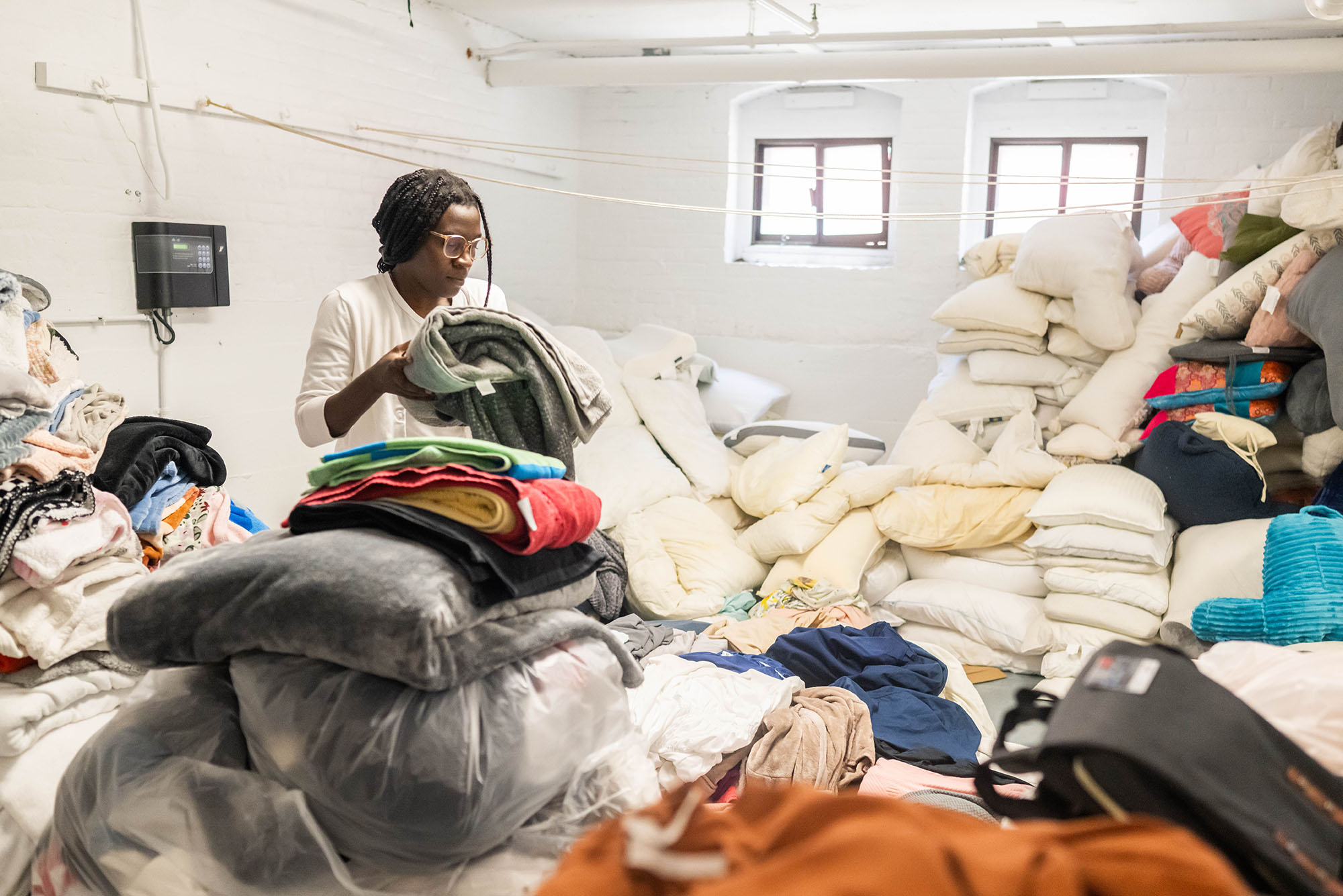Teaming Up with BU Sustainability to Give Bed Sheets and Towels a New Life

Maria Gorret Nampiima (STH’26, SSW’26) organizes discarded textiles, preparing them for donation to local outreach programs and nonprofits around Boston.
Teaming Up with BU Sustainability to Give Bed Sheets and Towels a New Life
Maria Gorret Nampiima (STH’26, SSW’26) has spent her summer running a pilot program that donates used textiles to those in need
From clothing to towels to bed sheets, nearly 92 million tons of textile waste are produced around the world each year. This results in consistently overfilling landfills, water pollution, resource depletion, and even increased greenhouse gas emissions as discarded textiles are incinerated.
When Maria Gorret Nampiima (STH’26, SSW’26) first arrived at Boston University to study at the School of Theology, she was interested in whether the United States had a better waste management system than her home country of Uganda. She says she was surprised to find that despite having more organized recycling and waste management programs, the US systems still weren’t perfect.
While taking a class in the STH Faith and Ecological Justice Program during her second year at BU, Nampiima decided to study BU’s waste management systems for her capstone project. With the help of BU Sustainability, she was able to collaborate with Casella Waste Management—the external company that collects the University’s waste—for her research.
One day, she retrieved a bag filled with what was supposed to be plastic discards. Upon opening it, she found a collection of lightly used paints that had been tossed.

“It was very eye-opening for me,” she says. “Within a couple of days, we found someone at a church who does art projects for kids, and they accepted the colors. So it kind of inspired me to think about waste in a very positive way.”
At the end of spring semester, Nampiima started working with BU Sustainability to help organize Move-out waste collection. She noticed that textiles like bedsheets, pillowcases, and duvets were often trashed and hardly ever donated, compared to clothing items.
In fact, according to Sarah Healey, zero waste manager at BU Sustainability, almost 13 percent of BU’s yearly trash is generated during the month of May, with only 29 percent diverted from incineration through donation or recycling efforts.
Nampiima says that secondhand stores like Goodwill—which receive many donations from BU students—are hesitant to accept bedsheets, blankets, and other bed linens due to concerns about skin diseases or bedbugs that may have infested the textiles.
After several meetings with Healey and Rebecca Copeland, an STH associate professor of theology and director of the Faith and Ecological Justice Program, Nampiima was able to find organizations that would accept these textiles provided they were laundered.
“Some immigrants come [to the United States] with nothing,” Nampiima says. “And there are a lot of immigrant populations in Massachusetts, so most of them are open to receiving bedsheets if they’re laundered.”

Through weekly meetings, Healey has helped Nampima launch a textile donation pilot program, lending her expertise in textile collection and logistics.
“What I love about this program is that it is not just focused on waste reduction, as these items were getting diverted before this program,” Healey says, “but it is focused on getting the materials to their best and highest use and benefiting our broader community.”
Since the beginning of the summer, Nampiima has been working alongside fellow student Katherine Reilly (CDS’27) at a laundry room on the Fenway Campus to take inventory, clean, fold, and organize hundreds of bedsheets.
With the help of the Faith and Ecological Justice Program, Nampiima was able to make donations to the Cardinal Medeiros Transitional and First Step Outreach programs. She also gave a portion to STH, which will provide the textiles to international students starting their academic journey in the fall. She plans to continue donating textiles through August.
Despite the learning curve, the experience has been a “fulfilling one,” Nampiima says. “Many positive things can happen if good, willing people are out there to use their power to make small steps.”
BU’s Goodwill Not Landfill program accepts donations during the summer move out season. There are donation bins at the following locations for students enrolled in BU’s summer programs: 610 Beacon Street, Sleeper, Claflin, and Rich Halls, 518 Park (South Campus), 580 Commonwealth Ave., Peabody Hall (210 Riverway), 14 Buswell Street, and the Medical Student Residence (815 Albany St.).
Comments & Discussion
Boston University moderates comments to facilitate an informed, substantive, civil conversation. Abusive, profane, self-promotional, misleading, incoherent or off-topic comments will be rejected. Moderators are staffed during regular business hours (EST) and can only accept comments written in English. Statistics or facts must include a citation or a link to the citation.